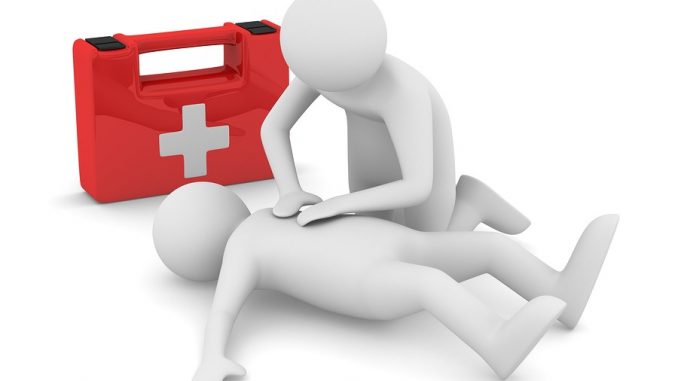
Table of Contents
First Aid Management:
a) Road Traffic Accident (RTA):
- Make sure, if the vehicle ignition is turned off in order to stop further fire exposures as there is a high chance of petrol leakage.
- Place the victim to a safer place away from the accident area and check for the injuries. Give priority to the seriously injured person.
- Look for the signs of breathing, removal of clothes around the neck so the victim can easily breathe and call for help in emergency number.
- Clear the airway by the use of the index or middle finger, in case of obstructions in the victim’s mouth and throat.
- Conduct Cardio pulmonary resuscitation (CPR) and other lifesaving skills.
- In case of mouth bleeding or vomiting, turn the victim to a comfortable position i.e. turn to his/her, side so there would be fewer chances of choking.
- In case of open wounds and heavy bleeding, place the wounded area with a piece of cloth using pressure with the help of palms so that it might stop bleeding until the medical help arrive.
- Every time be certain about spinal or head injuries if the victim’s neck is in an abnormal spot because that might create, more problems while moving the victim from one place to another.
- Victim should not be moved to different areas and should be kept in a comfortable position
- Emergency help should be made available immediately.
- Generally, accident victims are in shock and might feel extreme cold. Therefore, to avoid hypothermia, keep the victims warm.
- Do not feed the victim through the mouth as it could lead to choking and obstruction while breathing.
Prevention from Road Traffic Accidents:
- Speed limit: Ensure that the speed of the vehicle is always within the limit as suggested by the government/traffic boards.
- Do not mix drinking and driving
- It is better to take an alternate road than the busy ones.
- Strictly follow traffic rules
- Strict enforcement of speed limits
- Ensure heavy penalties for breaking traffic rules
- Ensure presence of clear traffic signals at crossroads, turnings and highways.
b) Drowning:
- Take out the victim from the water immediately or throw a rope to help the victim if the victim is conscious.
- Maintain victims head level in respect of their body, which decreases the probability of vomiting or spewing.
- Check for breathing. If the person is not breathing, check for pulse rate.
- If there is no pulse, begin mouth to mouth resuscitation/CPR.

Prevention from Drowning:
- If you are not trained in swimming, do not go to water/for swimming without any supervision.
- Do not try to learn swimming in river or moving water.
- Keep the emergency equipment nearby: Always have a water tube or rope nearby the swimming area, so that it can be used whenever required.
- Ensure the presence of lifeguard/trainer while swimming.
- Avoid alcohol: Don’t drink alcohol during and before swimming, boating or supervising children’s in the pool.
c) Acute Mountain Sickness/High Altitude Sickness:
- Run down to a lower altitude
- Provide oxygen to the victim in case of availability.

- Keep the victim warm.
- Resuscitation
- Provide the victim with plenty of fluids
- Avoid alcohol and sleeping tablets.
- Seek or call the help of health care provider.
Prevention of Acute Mountain Sickness:
- Slow ascent above 3000 m above the sea on an ascent rate of no more than 300 m per day. Allow acclimatization and prevent altitude sickness. (This rate may seem too low for many travelers. However, it is always recommended to be on a slower side than a rapid pace while climbing upwards)
- Person with respiratory or cardiac problems should be very cautious while climbing mountains. It is more safe for these people to not clinch the mountains.
References and For More Information:
https://www.mayoclinic.org/first-aid/first-aid-poisoning/basics/art-20056657
https://www.mayoclinic.org/first-aid/first-aid-snake-bites/basics/art-20056681
https://www.thehealthsite.com/diseases-conditions/first-aid-in-a-road-traffic-accident-51991/
https://www.paradisefirstaid.com.au/drowning-first-aid/
https://www.mayoclinic.org/first-aid/first-aid-fractures/basics/art-20056641
https://www.webmd.com/first-aid/mountain-sickness-treatment
https://pediatrics.aappublications.org/content/143/5/e20190850
https://patient.info/doctor/accidents-and-their-prevention
